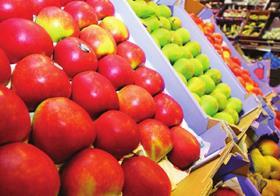
Brazilian apple exports fell by 43 per cent during the first quarter of 2011 to 21,700 tonnes, according to a recent GAIN report from the US Department of Agriculture (USDA), citing official data (SECEX).
Trade sources estimate that Brazil’s full-year apple shipments in 2011 will decrease by 22 per cent, compared with the 90,839 tonnes distributed last year (which was down 8 per cent on 2009).
The contraction is attributable to reduced fruit quality due to unfavourable weather conditions during the stages of fruit development, according to the report.
In addition, the USDA said last year’s flooding in the Rio Grande do Sul region damaged the infrastructure and consequently distribution is not running as smoothly as usual.
As a result of the adverse climate conditions, trade sources expect Brazilian apple production to decrease by 3 per cent in 2011, against the 1,275 tonnes produced in 2010.
The report said the quality of the 2011 harvest has been affected by disease problems on some orchards due to an excess of moisture in 2010 which started with heavy rainfall.
Harvesting of the Fuji variety began in mid-March, with producers predicting volume this season to be similar to that of past years with the same quality as last year’s crop.
“There were sufficient cold nights and warm days in early March (the period of maturation of the fruit) to lead to good colouration,” the USDA said.
“And although hailstorm has affected Brazil’s Fuji orchards, the level of damage was far less to the Fuji crop than to the Gala crop.”
Brazil’s apple imports are also expected to increase in year 2011/12, according to the USDA.
In 2010, Brazil imported 25 per cent more apples compared with 2009 due to lower quality of domestic apples and favourable exchange rates.
Separately, trade sources forecast the 2011 Brazilian table grape export crop to remain at the same level or slightly decrease from 60,805 tonnes last year.
The estimate is based on softening demand and rainfall during the first months of 2011, which has decreased quality and yields, and will therefore limit exports.



